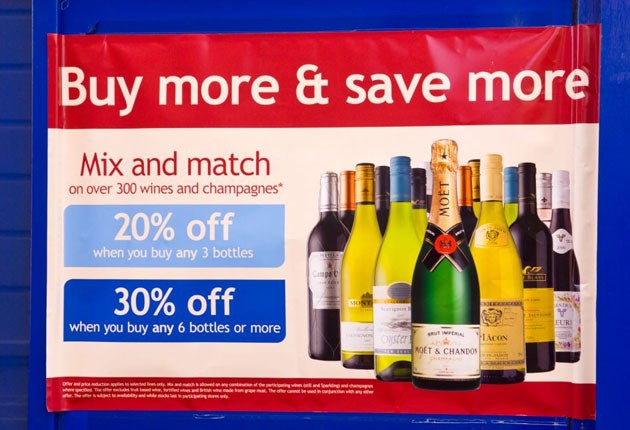MPs demand an increase in the minimum price of alcohol
Commons committee says Government has failed to control drinks industry

Your support helps us to tell the story
From reproductive rights to climate change to Big Tech, The Independent is on the ground when the story is developing. Whether it's investigating the financials of Elon Musk's pro-Trump PAC or producing our latest documentary, 'The A Word', which shines a light on the American women fighting for reproductive rights, we know how important it is to parse out the facts from the messaging.
At such a critical moment in US history, we need reporters on the ground. Your donation allows us to keep sending journalists to speak to both sides of the story.
The Independent is trusted by Americans across the entire political spectrum. And unlike many other quality news outlets, we choose not to lock Americans out of our reporting and analysis with paywalls. We believe quality journalism should be available to everyone, paid for by those who can afford it.
Your support makes all the difference.The drinks industry depends for its profits on people drinking harmfully or hazardously who between them consume three-quarters of all the alcohol sold in Britain, a committee of MPs will say today. Accusing ministers of a "failure of will" over controlling the industry, they will point out that if people drank responsibly, within the limits advised by medical organisations, sales of alcohol would plummet by 40 per cent.
But health warnings about the dangers of excessive drinking are drowned out by an industry that peddles myths to promote its sales, according to the MPs. In a scathing analysis of the stranglehold which the drinks industry has over the Government and the nation, the all-party Commons health select committee will accuse ministers of cosying up to the firms that dominate the market.
It calls for tough measures to curb alcohol consumption, including a minimum price of at least 40p per unit compared with supermarket prices that are as low as 10p a unit, a rise in duty, independent regulation of alcohol promotion and mandatory labelling.
The idea of a minimum price, aimed principally at supermarket promotions where beer can cost less than water, was first raised by the Government's chief medical officer Sir Liam Donaldson last year but was immediately rejected by Gordon Brown because, he claimed, it would penalise moderate drinkers.
The health committee will flatly reject this argument as a myth fostered by the alcohol lobby, saying that at 40p a unit it would cost a moderate drinker consuming the average six units weekly (three pints of ordinary bitter) 11p more a week than at present. A woman drinking 15 units a week, equivalent to one and a quarter bottles of wine, could buy her weekly total of alcohol for £6.
Kevin Barron, chairman of the committee said: "The facts about alcohol are shocking. Successive governments have failed to tackle the problem and it is now time for bold government. Even small reductions in the number of people using alcohol could save the NHS millions. What is required is fundamental cultural change. Only this way are we likely to reduce the dangerous numbers of young people drinking their lives away."
One in 10 of the population consumes almost half (44 per cent) of all the alcohol drunk. Consumption has soared in recent decades and three times as much is now drunk per head as in the middle of the last century. Alcohol is estimated to cause 30,000 to 40,000 deaths a year.
It is calculated that a minimum price of 50p a unit would save more than 3,000 lives a year. But the response of successive governments had "ranged from the non-existent to the ineffectual", the committee will say.
Simon Litherland, managing director of Diageo GB, the world's largest beer, wine and spirits firm, said: "This report represents yet another attempt by aggressive sections of the health lobby to hijack alcohol policy-making."
Public health minister Gillian Merron said: "Alcohol is an increasing challenge to people's health – we are working hard to reverse the trend and are constantly seeking better ways to tackle it."
Join our commenting forum
Join thought-provoking conversations, follow other Independent readers and see their replies
Comments